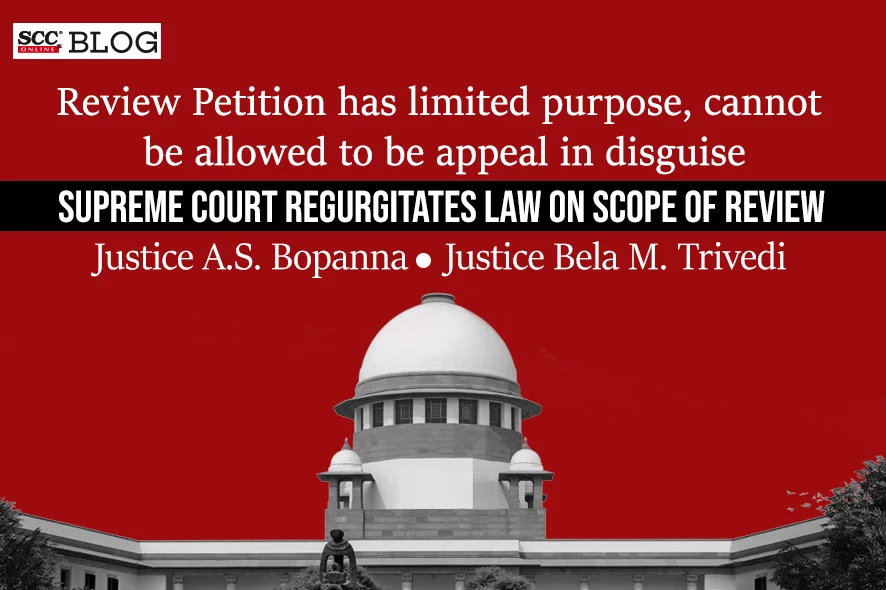Supreme Court: In a batch of review petitions seeking review of the common judgment and Order dated 06-09-2022 in two appeals preferred by the State Tax Office, the division bench of A.S. Bopanna and Bela M. Trivedi*, JJ. while dismissing the review petition, opined that a well-considered judgment sought to be reviewed does not fall within the scope and ambit of review.
The appeal was against the Judgment and Order dated 19-12-2019 passed by the National Company Law Appellate Tribunal (‘NCLAT’), wherein the Tribunal dismissed the appeal against the order , wherein it was held that the appellant cannot claim first charge over the property of the Corporate Debtor, as Section 48 of the Gujarat Value Added Tax 2003 (‘GVAT Act’) cannot prevail over Section 53 of the Insolvency and Bankruptcy Code, 2016 (‘IBC’). The Court had held that NCLAT clearly erred in its observation that Section 53 IBC overrides Section 48 GVAT Act. Further, Section 48 GVAT Act is not contrary to or inconsistent with Section 53 or any other provisions of IBC
Scope of Review:
The Court said that the power to review its judgments has been conferred on the Supreme Court by Article 137 of the Constitution of India. This power is subject to the provisions of any law made by the Parliament, or the Rules made under Article 145.
After taking note of various decisions, the Court stated the following:
-
A judgment is open to review inter alia if there is a mistake or an error apparent on the face of the record.
-
A judgment pronounced by the Court is final, and departure from that principle is justified only when circumstances of a substantial and compelling character make it necessary to do so.
-
An error which is not self-evident and has to be detected by a process of reasoning, can hardly be said to be an error apparent on the face of record justifying the court to exercise its power of review.
-
In exercise of the jurisdiction under Order 47 Rule 1 CPC, it is not permissible for an erroneous decision to be “reheard and corrected.”
-
A Review Petition has a limited purpose and cannot be allowed to be “an appeal in disguise.”
-
Under the guise of review, the petitioner cannot be permitted to reagitate and reargue the questions which have already been addressed and decided.
-
An error on the face of record must be such an error which, mere looking at the record should strike and it should not require any long-drawn process of reasoning on the points where there may conceivably be two opinions.
-
Even the change in law or subsequent decision/ judgment of a co-ordinate or larger Bench by itself cannot be regarded as a ground for review.
Analysis:
After taking note of the legal position of seeking review, the Court reiterated that a co-ordinate Bench cannot comment upon the judgment rendered by another co-ordinate Bench of equal strength and that subsequent decision or a judgment of a co-ordinate Bench or larger Bench by itself cannot be regarded as a ground for review.
The Court rejected the submissions made by the Review Petitioners that the Court in the impugned decision had failed to consider the waterfall mechanism as contained in Section 53 IBC and failed to consider other provisions of IBC, as it is evident from the impugned judgment, that the Court had considered not only the waterfall mechanism under Section 53 IBC but also the other provisions of the IBC for deciding the priority for the purpose of distributing the proceeds from the sale as liquidation assets.
The Court said that the Court in the impugned judgment had categorically reproduced Section 53, other provisions of IBC along with the Regulations of 2016, and the subsequent amendments in the Regulations of 2018, regarding the submission of claims to be made by the creditors.
The Court opined that a well-considered judgment sought to be reviewed does not fall within the scope and ambit of Review. The Review petitioners have failed to make out any mistake or error apparent on the face of record in the impugned judgment and have failed to bring the case within the parameters laid down by this Court in various decision for reviewing the impugned judgment. Thus, the Court dismissed the review petition.
[Sanjay Kumar Agarwal v. State Tax Officer (1), 2023 SCC OnLine SC 1406, decided on 31-10-2023]
*Judgment Authored by: Justice Bela M Trivedi
Know Thy Judge | Supreme Court of India: Justice Bela Madhurya Trivedi







